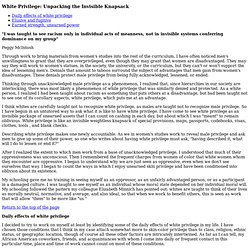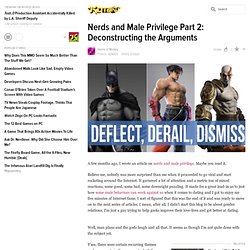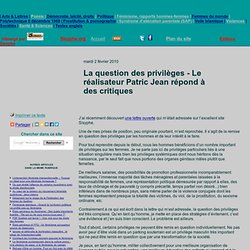

Dear Vagenda Editors… White Privilege: Unpacking the Invisible Knapsack by Peggy McIntosh. White Privilege: Unpacking the Invisible Knapsack "I was taught to see racism only in individual acts of meanness, not in invisible systems conferring dominance on my group" Peggy McIntosh.

Nerds and Male Privilege Part 2: Deconstructing the Arguments. First of all, I want to go ahead and call attention to the irony that I am making this post under the moniker "Gaston," possibly one of the most misogynistic characters of any family feature.

I'm just taking that zinger away from you right away, commenters. Now there's a lot of issues in this editorial, as with the first editorial, but I only have time to talk about one that especially peeved me with its sheer hypocrisy. The criticism that it's the antagonists who spout sexist vitriol is NOT a derailment, it's a legitimate point that the author, ironically, derails by making a completely different point: that the inmates of Arkham City should want to rape Batman as much as they want to rape Catwoman. So why isn't it a derailment? Because the message being communicated by a character must be interpreted in the context of that character's relationship to the protagonist(s) and the audience.
Nerds and Male Privilege. Www.library.wisc.edu/EDVRC/docs/public/pdfs/LIReadings/InvisibleKnapsack.pdf. La question des privilèges - Le réalisateur Patric Jean répond à des critiques. J’ai récemment découvert une lettre ouverte qui m’était adressée sur l’excellent site Sisyphe.

Une de mes prises de position, peu originale pourtant, m’est reprochée. Il s’agit de la remise en question des privilèges par les hommes et de leur intérêt à le faire. Pour tout reprendre depuis le début, nous les hommes bénéficions d’un nombre important de privilèges sur les femmes. Je ne parle pas ici de privilèges particuliers liés à une situation singulière mais bien les privilèges systémiques dont nous héritons dès la naissance, par le seul fait que nous portions des organes génitaux mâles plutôt que femelles. Contrairement à ce qui est écrit dans la lettre qui m’est adressée, la question des privilèges est très complexe.
Tout d’abord, certains privilèges ne peuvent être remis en question individuellement. En revanche, d’autres privilèges peuvent être combattus individuellement. Et là aussi, la difficulté est grande. Male privilege. White privilege. White privilege (or white skin privilege) refers to the set of societal privileges that white people benefit from beyond those commonly experienced by people of color in the same social, political, or economic spaces (nation, community, workplace, income, etc.).

[note 1][neutrality is disputed] The term denotes both obvious and less obvious unspoken advantages that white persons may not recognize they have, which distinguishes it from overt bias or prejudice.[1] These include cultural affirmations of one's own worth; presumed greater social status; and freedom to move, buy, work, play, and speak freely.[2] The concept of white privilege also implies the right to assume the universality of one's own experiences, marking others as different or exceptional while perceiving oneself as normal.[3][4] It can be compared to and/or combined with the concept of male privilege. History of the concept[edit] In his 1935 Black Reconstruction in America, W. E. B. According to Ella L. Aspects[edit] Privilège du masculin. Le privilège masculin et le “privilège blanc” - conférence Mille Babords. Déballer le havresac invisible par Peggy McIntosh, 31 octobre 2005 Peggy McIntosh est directeure associée du Centre de Wellesley Collage pour la recherche sur les femmes.

Cet essai est extrait de « Working Paper 189 ». « White Privilege and Male Privilege : A Personal Account of Coming To See Correspondences through Work in Women’s Studies » (1988), par Peggy McIntosh. Peggy Mc Intosh, chercheuse américaine, fait le lien entre le refus d’identifier les privilèges masculins dans la société, et celui de reconnaître le “privilège blanc” par ceux qui en bénéficient... « En travaillant à introduire des notions d’études-femmes dans le reste du programme, j’ai souvent remarqué le refus des hommes de reconnaître qu’ils étaient sur-privilégiés même s’ils pouvaient reconnaître que les femmes étaient désavantagées. . « On m’a appris à voir le racisme uniquement dans des actes individuels méchants, et pas dans des systèmes conférant une prédominance sur un groupe. »